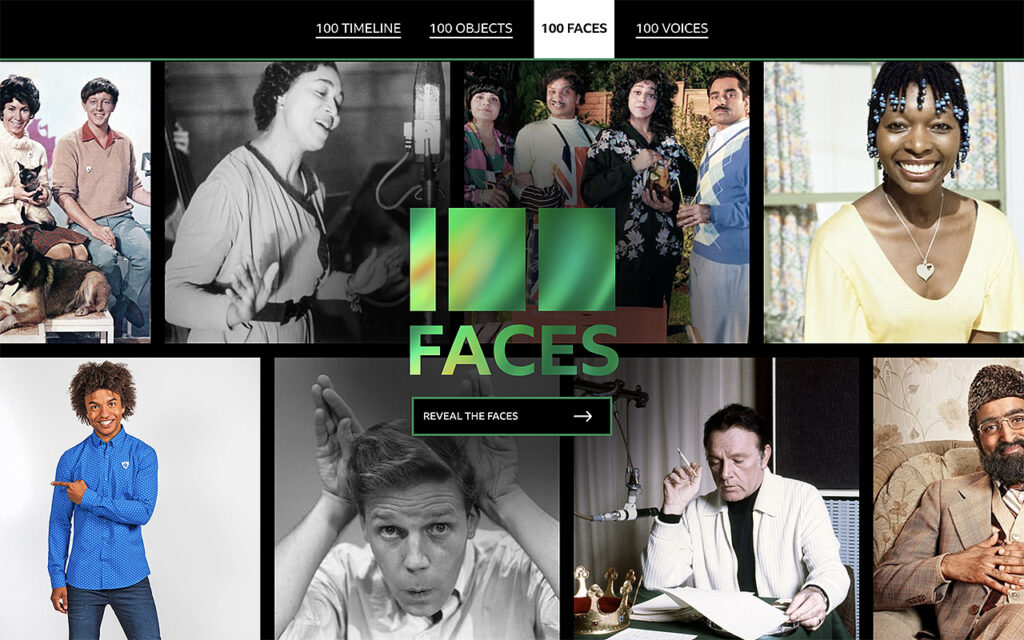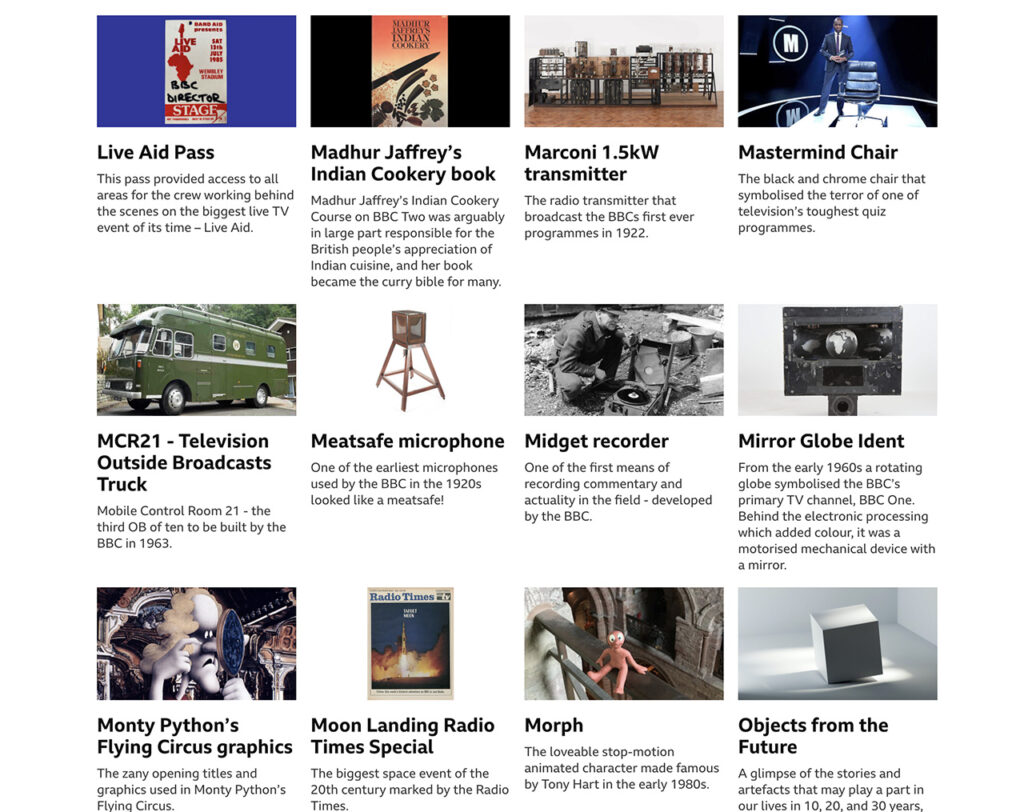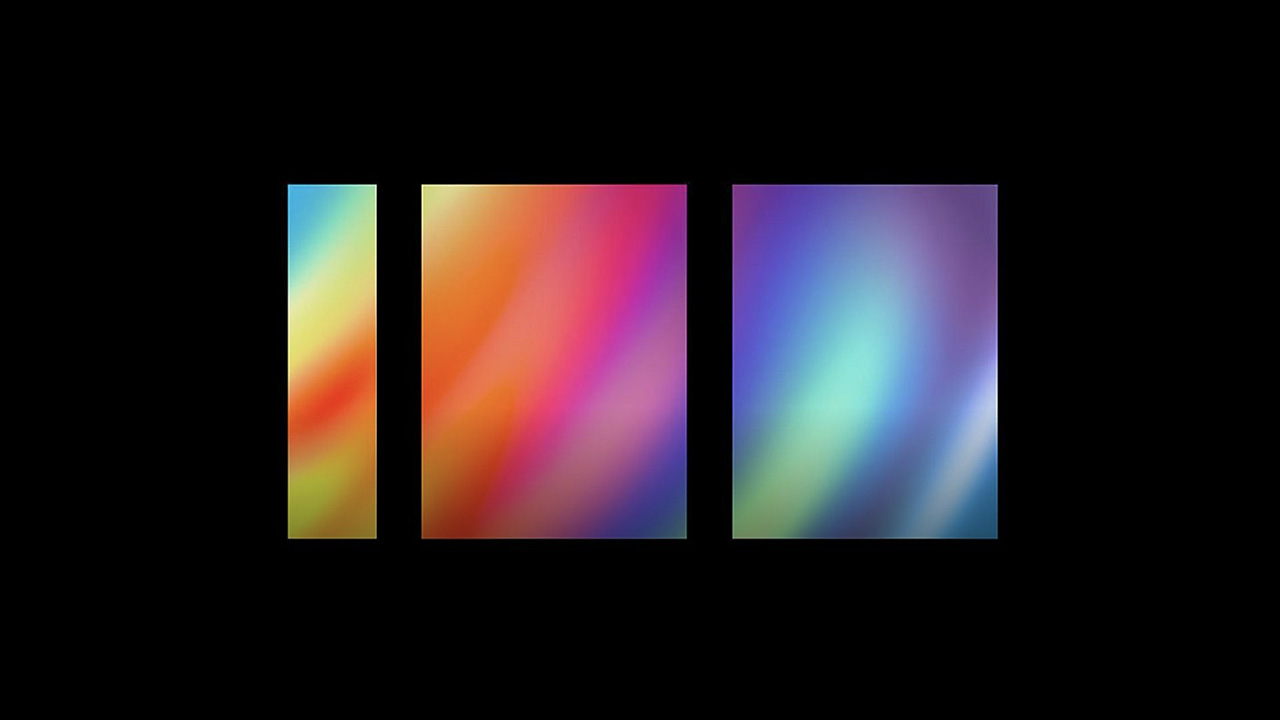In December 1922, the British Broadcasting Corporation (BBC) embarked on its mission, inaugurated by then General Manager John Reith, to “inform, educate and entertain.” A century on, the crown-chartered broadcasting service soldiers on with the same directive, albeit with a vastly expanded presence that spans mediums and subsidiaries, and reaches a weekly global audience of 489 million. Along the way, it catalyzed the UK’s cultural, social, and economic development in ways that have enthroned the broadcaster as a national icon.
So when it comes to marking its centenary this year, the BBC doesn’t lack for history or milestones to commemorate. This, the corporation is accomplishing with a flurry of special programs, but also, with the most 21st century of formats, a digital exhibition.
What happened

Visitors to BBC 100 can navigate the corporation’s history through a timeline or searchable collections, 100 Faces, 100 Voices, and 100 Objects. Image: BBC 100
The BBC has unveiled the online portal, BBC 100, which houses a trove of editorial and multimedia content from the broadcaster’s archives under the simple tagline “100 years of our BBC.” Visitors can access this 100-year history via a timeline, or through three searchable collections, 100 Faces, 100 Voices, and 100 Objects, which individually array visual and oral histories of the BBC.
In particular, the latter section has gathered 100 artifacts, not limited to artwork, props, documents, and technology, that collectively “made the BBC.” Included here are objects as diverse as the Emitron camera used by the BBC in the 1930s, David Attenborough’s 1952 handwritten job application, the opening graphics for Monty Python’s Flying Circus, the BBC’s first website from 1997, and its COVID online tracker.
The above collection has been curated in partnership with a number of regional museums, including key collaborator, the Science Museum Group. Besides pulling objects from its collection for the online exhibition, the Group will further digitize another 1,000 artifacts from the BBC Heritage archives for a Spring 2022 launch, in concert with a host of events, including the upcoming Switched On exhibition on broadcast technologies at the National Science and Media Museum.
Why it matters

The 100 Objects collection was curated in partnership with regional museums including the Science Museum Group. Image: BBC 100
Cultural heritage continues to get the digital treatment as part of a national drift toward digital preservation and greater accessibility. Currently ongoing, Towards a National Collection by the UK’s Arts and Humanities Research Council is endeavoring to create a unified collection of digital heritage, while other national heritage organizations have sought innovative ways to virtually platform their archives.
Spurred by lockdown-era online habits, a project such as BBC 100 is further geared toward making cultural heritage newly resonant for a natively digital audience. The broadcaster may have tapped a contemporary medium to do so, but its time-tested mandate is borne out in the exhibition’s contents that stay informative, educational, and entertaining.
What they said
“The BBC has an amazing history which belongs to us all. As we mark 100 years of our BBC, these new digital resources, partner exhibitions, research and publications give a unique insight into the history of the Corporation and provide something to intrigue audiences of all ages.” — Robert Seatter, Head of BBC History
“We are delighted to be part of 2022’s BBC 100 celebrations and to be telling the story of a century of broadcasting, as well as looking at the exciting possibilities of broadcast technologies in the future.” — Sir Ian Blatchford, Director and Chief Executive, Science Museum Group



